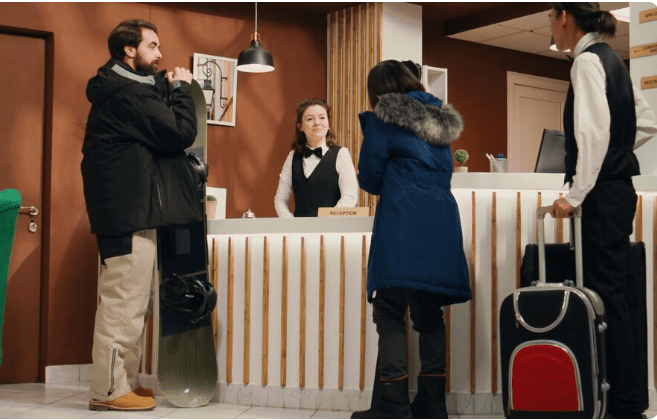In 2015, visitors entered the Henn na Hotel in Japan and were met by no one. Rather, they were greeted by a bellhop-cap-wearing, robotic dinosaur that blinked its plastic eyes and gave courteous English directions. A humanoid robot was in charge of check-in nearby, and mechanical fish moved through a lobby tank. It was a fantastical picture of the future of hospitality that was incredibly successful in grabbing people’s attention.

Henn na, which translates loosely to “strange,” was the idea of businessman Hideo Sawada, who had a vision for a fully automated hotel that could both provide charm and efficiency. For a while, it was a remarkable experiment. In order to serve over 300 visitors, the hotel first employed 30 human staff for 140 rooms. Later, it lowered that number to just seven, demonstrating an incredibly efficient ratio that impressed both technologists and economists.
The World’s First Hotel Staffed Entirely by AI — Guests Are Shocked
| Category | Details |
|---|---|
| Hotel Name | Henn na Hotel (meaning “Strange Hotel”) |
| Location | Nagasaki, Japan |
| Founded | 2015 |
| Founder | Hideo Sawada |
| Core Concept | The first hotel fully staffed by artificial intelligence and robotic systems |
| Distinct Features | Robotic receptionists, AI concierges, self-operating luggage handlers, automated cleaning, and voice assistants |
| Technological Partners | IBM Watson, Meikai University (AI and robotics research collaborations) |
| Key Experts | Dr. Nick Naumov (University of Northampton), Dr. Björn Schuller (Imperial College London) |
| Focus | Innovation in hospitality through automation, efficiency, and AI-driven guest experiences |
| Reference |
The idea is “brilliant from an operational cost perspective,” according to Dr. Nick Naumov, a specialist in tourism and hospitality management at the University of Northampton. After all, robots don’t require paychecks, lunch breaks, or sleep. They can be copied indefinitely, complete tasks reliably, and retain instructions flawlessly. That was the theory, anyway.
However, the novelty and media attention quickly gave way to fissures. Visitors learned that although the robots were effective, they had limitations. Both the Japanese-speaking humanoid at reception and the English-speaking dinosaur were only proficient in one language. Even with the later addition of Mandarin and Korean, many visitors still found communication to be annoyingly inflexible. A Scottish tourist once hilariously struggled to have his passport scanned by a robot that was unable to detect certain international formats, documenting his entire check-in experience on YouTube.
The futuristic promise waned even further within the rooms. Every suite had “Churi,” an AI voice assistant made to handle basic duties like regulating the temperature or turning on and off lights. However, visitors used to Alexa or Siri’s subtle conversational style thought Churi was less striking. The gadget would wake visitors with happy but ill-timed reactions since it would mistake snores for requests.
Dr. Björn Schuller, an artificial intelligence professor at Imperial College London, describes it as a situation where technological optimism and realism collided. “AI is incredibly powerful, but not everywhere. It does well when conveying information or completing certain tasks rapidly, but it struggles in social situations that require empathy and flexibility.
As maintenance costs increased, the novelty started to wear off. Human engineers were needed to diagnose, change batteries, and update software on a regular basis for robots. The hotel had to rehire extra human staff to deal with the frequent faults after guests reported that half of the lobby robots were broken. Robots require maintenance, just like any other equipment, according to Naumov. Installing them and forgetting about them is not an option.
More over half of Henn na’s 243 robots have been fired by 2019. Retired was the dinosaur receptionist. They silenced the AI concierges. The recycling droids ceased to prowl the corridors. Paradoxically, the hotel that had promised a future entirely automated by robots subtly went back to depending on people.
Nevertheless, hospitality was forever changed by the experience. It compelled the industry to reevaluate the limits of automation and the areas where human interaction is still indispensable. One of the first effective examples to apply Henn na’s lessons was Hilton’s AI concierge “Connie,” which was driven by IBM’s Watson. Connie’s duties are restricted to directing visitors around the property, providing local recommendations, and responding to inquiries. It is incredibly effective without feigning to take the place of human affection.
In a similar vein, Marriott and Yotel deployed “robot butlers” that could bring food, coffee, or towels. These automated assistants carry out particular duties without the difficulty of human communication. Hotels were able to sidestep many of the problems that beset Henn na by focusing on their primary function. “The human touch—it may simply become the new currency of luxury hospitality,” as Naumov states, “will never disappear.”
The current stratification of the hotel business is a glaring example of this reinterpretation. In the future, low-cost lodging establishments might have very few human employees and rely on robots to handle basic visitor requests, check-ins, and housekeeping. Luxury hotels, on the other hand, are putting even more emphasis on human presence, highlighting empathy, emotional intelligence, and artistic ability as the key differentiators. In this way, automation has emphasized human value rather than lessened it.
Additionally, trust is still a sensitive topic. According to Schuller, “we naturally assume a human concierge is sharing insider advice.” We believe they are assisting us directly, even if they are directing us to partner eateries. We are aware that a robot is representing the hotel. This subtle yet psychologically potent distinction is between perceived loyalty and programmed service. Robots are predictable, but humans are not. Their strength and weakness are that dependability.
It’s interesting to note that visitors react better when robots accept their artificiality rather than try to emulate humans. The robots from Hilton and Marriott are sleek, practical, and purposefully non-human. In comparison, Henn na’s humanoid drawings were eerie. “It’s the uncanny valley,” says Schuller. We find it unsettling when something appears nearly human but not quite. Visitors feel as though the spark of life is missing.
However, the development of AI has not halted. Marriott’s robot “Mario” rose to fame in Belgium by making appearances at football teams, schools, and even giving farewell speeches. Mario capitalized on his charisma and personality to succeed where others failed. Robots like Mario are perhaps the forerunners of the upcoming generation of intelligent hospitality systems, thanks to developments in affective computing—the study of AI’s comprehension of human emotion.
In the years to come, artificial intelligence (AI) will be able to read tone, context, and even micro-expressions, according to Schuller. In real time, it will adjust its personality. Consider a humorous or empathetic AI concierge that can recall your favorite wine from a past visit or recognize when you’re tired and turn down the lights accordingly. With that degree of reactivity, automation might become truly interesting.
Design circles are already debating the possibility of “celebrity AI.” In the future, guests may select hotels depending on the AI personality that works there, such as a clever virtual bartender, an elegant sommelier, or a soothing, therapeutic assistant. Engaging with a well-known AI may become as desired as dining at a Michelin-starred restaurant in a time when digital identity carries status.
Despite its missteps, the Henn na Hotel set the stage for such possibility. It demonstrated that automation is a mirror reflecting both the possibilities and constraints of human aspiration rather than a gimmick. The hotel’s tale is one of humility rather than failure.
One reporter inquired as to whether the velociraptor receptionists would be missed when they were eventually dismissed. “Now that guests don’t call us to fix the robots, it’s easier,” a longtime employee reportedly grinned. However, there is a fundamental truth hidden beneath the hilarity. Innovation rarely comes fully formed; instead, it evolves, changes, and sometimes breaks down.
